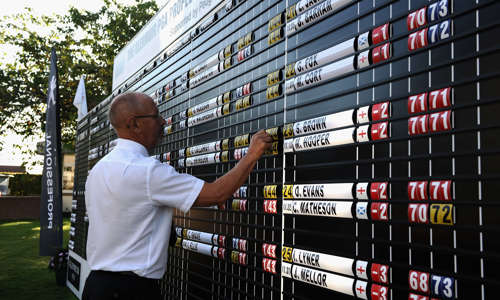
A pioneering health initiative in Fife has seen a golf programme offered to some NHS patients to encourage a more active and social lifestyle.
The men and women of The PGA have always played a vital role at the very heart of golf. And now their experience, expertise and enthusiasm is being used to help the hearts of others, as pros in Scotland have been called on to help improve physical and mental health through the game.
In a pioneering initiative in Fife, The PGA collaborated with partner organisations to develop Golf for Health, a pilot project which has enabled primary care professionals and community link workers to prescribe golf for eligible patients in an effort to encourage a more active lifestyle.
GP practices in Fife were invited to take part in the study and were linked in to four local clubs – Cluny Clays, Dunfermline, Dunnikier Park and Elmwood – which offered a six-to-eight week, free-of-charge programme.
Research has revealed that, on average, golfers live five years longer than non-golfers while the game itself, as a physical activity, can help prevent and treat 40 major chronic diseases, including diabetes, heart attacks, strokes, breast and colon cancer, depression and dementia.
CLICK HERE to find out more about the Golf for Health project.
“A great benefit in The PGA being involved is that it shows we are central not just to golf but to the community as well,” said Allan Martin, The PGA in Scotland’s Coach and Education Manager.
“We are providing that community support with the relationship to the GP practices through the people referred to us. That’s a big feather in the cap. With golf being a life sport, it lends itself really well to this sort of initiative. If we can use golf to enhance the physical and emotional side of people’s lives, then that’s a huge benefit not only to those taking part but to the game as a whole.”
The R&A and the University of St Andrews School of Medicine worked closely with Fife Golf Trust, NHS Fife, Scottish Golf, the European Tour Group, the Ladies European Tour and The PGA to develop the model, with respected medical professional, Doctor Andrew Murray, also involved.
“The work of the PGA Professionals has been central to the initiative,” noted Lynsey Brown, a research fellow at the University of St Andrews. “They have put the various programmes together to really emphasise the social aspect of golf and get those on the programme really involved.”
For the PGA Pros delivering the programme, the Golf for Health initiative proved to be an engaging, rewarding and eye-opening experience.
Alasdair McDonald is a PGA Professional based at Dunnikier Park. He is used to dealing with various walks of golfing life and the Golf for Health initiative underlined just what an all embracing game it can be.
He said: “I’ve been coaching for the best part of 15 years. I know what works and what doesn’t. And this initiative certainly worked. I had four or five coming to the sessions, which is a good number for spending quality time with each individual.
“We had people from different backgrounds who were dealing with various issues. Some had mental health problems, one suffered from bad anxiety. But everyone got on really well. We didn’t push them too much and just let them enjoy it. One of the women couldn’t make a session as she was on holiday but when she returned, she told me that she went to find a driving range while on her trip. She’d caught the golfing bug so that was encouraging to hear.
“Getting people active and healthy is one thing and if we can keep them in the game then everybody benefits.”
Getting people active and healthy is one thing and if we can keep them in the game then everybody benefits.
- Alasdair McDonald (Dunnikier Park) - PGA Professional
PGA Professional Kevin Moran had used golf to encourage social activity in a previous programme he organised. The Golf for Health initiative at Cluny Clays and Dunfermline allowed him to build on that experience and use his expertise to help others.
He said: “I had witnessed at first hand the benefits of doing something like this so was very keen to embrace Golf for Health. For 10 years, we had held coffee mornings and group sessions to get people out of the house and mingling again. People had maybe lost a husband or a wife and it helped to get them back on track. The golf became almost secondary. It was the social interaction that was the big thing. With Golf for Health, I used the time we had to build confidence.
“After Covid, some people emerged with a lack of confidence and were terrified of going out or being in groups. I would get my group to sit around the table and just chat for the first 30 minutes. We’d talk about their illnesses and how they coped. They got things off their chest. Some lived on their own and the people in the group were the first people they had spoken too that week. It really helped to open them up.
“For me personally, it was very rewarding, seeing people enjoying something that they thought they may never enjoy again. The whole programme was a great advert for golf and its wider benefits.”
Martin Goldie has been a PGA Professional for almost 30 years and delivering the Golf for Health programme proved to be a highly rewarding addition to his CV.
He said: “It was a wee bit of an eye opener for me, in the sense that it makes you appreciate how lucky you are in terms of your own health.
“One of the ladies that came was getting some respite from her husband who had dementia and she was using this as a chance to get away from the worry about that for a spell. There was another lady who had a stroke and was getting the strength and mobility back in her arm and hand.
“Your health is your most important thing and you’re very lucky to have it. Helping those not so fortunate is very satisfying. I had four in my group and two have already become members at the club.
“The whole experience was really good for everybody. I just love meeting people and hearing what their lives are like. You form bonds with these people.
“Regardless of who I coach, I just want them to enjoy it and I give them plenty of encouragement. I was telling them not to worry where the balls were going and just try their best and attempt to do what we were asking of them. Once they saw the ball going in the air and straight towards a target, well, that made their day. When they see a bit of success and progress, they really get into it.
“If this initiative could be rolled out across the country then it would be a wonderful thing for the home of golf.”
CLICK HERE to find out more about the Golf for Health project.




































